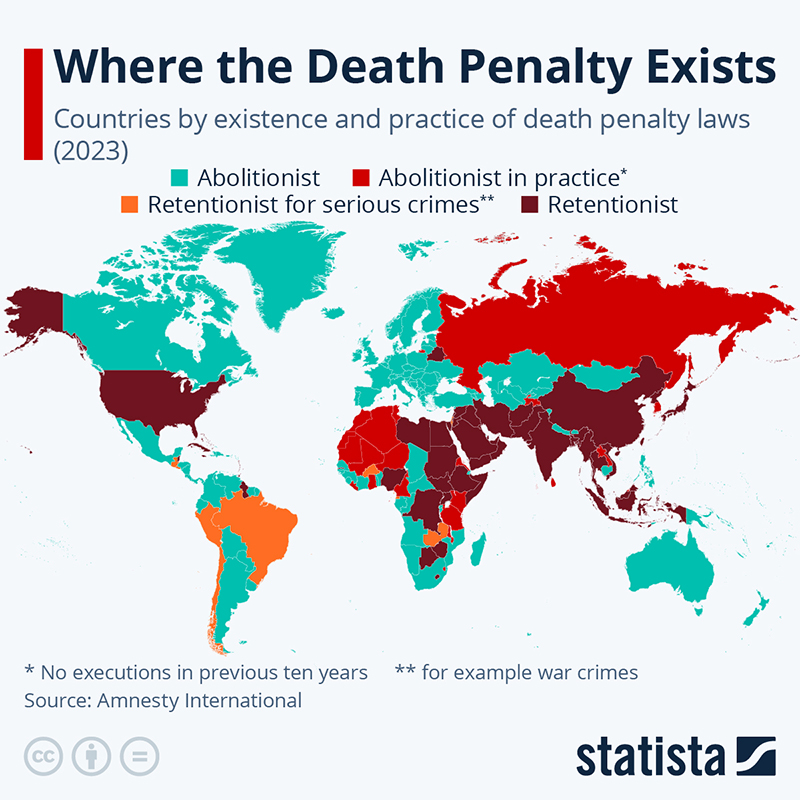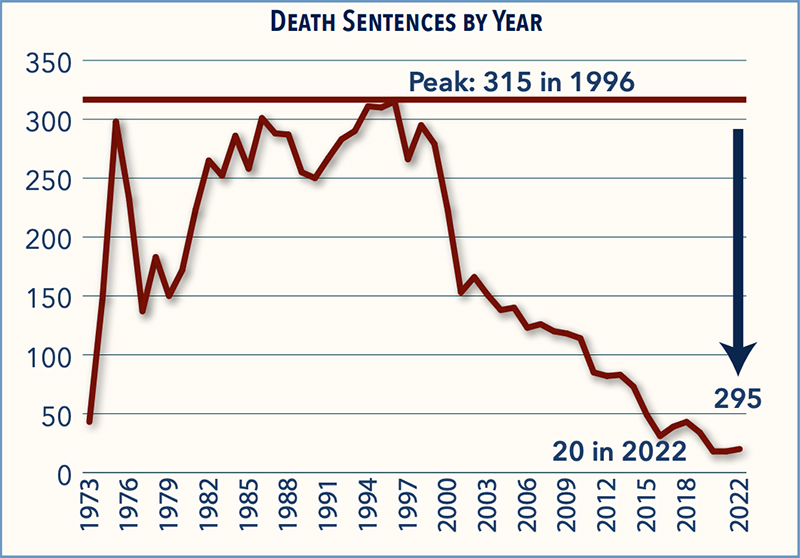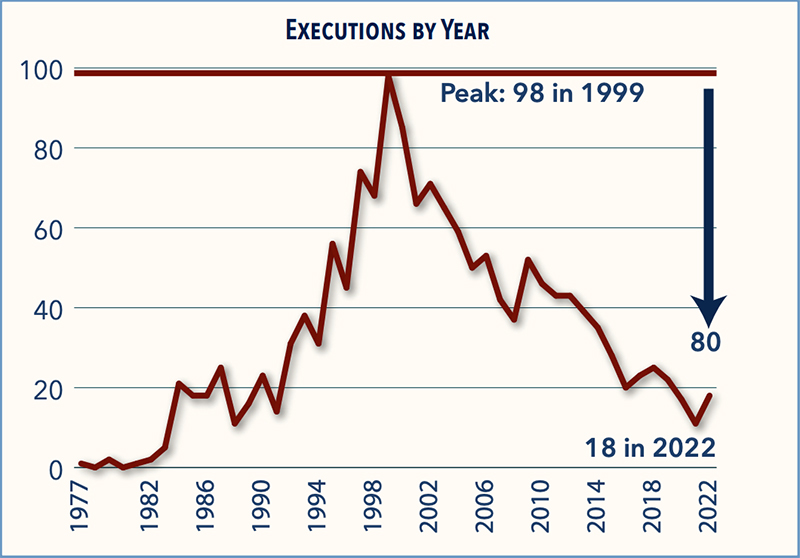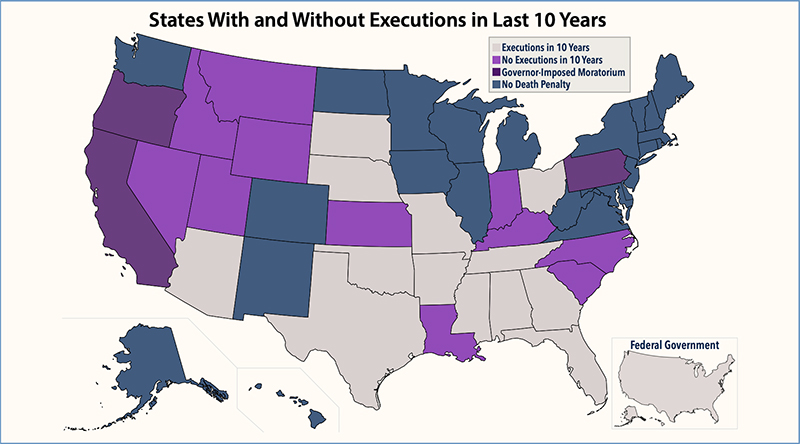Volcanoes are erupting in The Philippines, but on-fire Australia received some welcome rain. The Iran war cries have been called off and The Donald’s military powers are about to be hamstrung by the Senate. Meanwhile, his impeachment trial is starting, and we’re all on Twitter for a front-row seat.
What Could Go Right? More countries abolish the death penalty
Ghana joins 123 other nations in ending capital punishment, as the practice quickly (and quietly) recedes.
This is our weekly newsletter, What Could Go Right? Sign up here to receive it in your inbox every Thursday at 5am ET. You can read past issues here.
More countries are abolishing the death penalty
On July 25, Ghana became the 124th country globally and the 29th in Africa to abolish the death penalty. It remains on the books for high treason only. The trend away from capital punishment is another measure of progress that has moved so fast that many don’t realize how different the world is today versus 50 years ago.
Mainstream media isn’t comprehensively keeping up with changes, either, which means I couldn’t find a fully up-to-date map with each country’s current death penalty status. This is the best one available, which doesn’t yet reflect Ghana’s revision:

We can compare that to 1977—the year Amnesty International marks as the start of global discussion around abolition—when only 16 countries had abolished the death penalty for all crimes.
Ghana is far from the only nation showing recent enthusiasm for reform. (Although in Ghana in particular, the enthusiasm has not been limited to capital punishment: parliamentarians there recently voted to decriminalize suicide and ban witchcraft accusations, which have led to the lynching of elderly people accused of being witches.) Since 2013, 18 countries have abolished the death penalty, 11 of them in Africa. Six, including Kazakhstan, Papua New Guinea, and Sierra Leone, abolished it as recently as 2021/22. In April 2023, Malaysia removed the mandatory death penalty for several offenses.
The use of the death penalty is more common in Asia and the Middle East, but even in those regions, executions are concentrated in specific countries. Outside of China, in 2022, ninety percent of executions occurred in just three countries: Iran, Saudi Arabia, and Egypt. China is not included in the list as they are notoriously secretive about their execution data, but Amnesty International labels them “the world’s most prolific executioner.”
In the Western world, the United States is an infamous outlier when it comes to the death penalty. Again, however, many do not realize how much the US has recently changed in this regard, and that the perspective on its abolishment is becoming more and more bipartisan.
So unremarkable was President Joe Biden’s support for ending the federal death penalty during his campaign, for instance, that I had forgotten about it until writing this article. And I doubt that I am the only one who didn’t realize that he is the first presidential candidate to campaign on that issue and still win the election. He has not made any movement on it since taking office, however.
Statewide, executions have dropped since the 90s and death sentences plummeted, according to the Death Penalty Information Center. Despite swirling perceptions of rising crime, in 2022, American support of the death penalty remained near a 50-year low, at 55 percent.


Thirty-seven states have either abolished the death penalty or not carried out an execution in more than a decade. Two states, Utah and Ohio, are seriously discussing abolition bills. The Ohio bill, a bipartisan effort, is currently under consideration. The Utah one, sponsored by two Republicans, failed in committee in a 6-5 vote. In Oregon, which retains the death penalty, former Governor Kate Brown commuted the sentences of all on death row in 2022.

As occurs in the rest of the world, executions in the US are concentrated in a handful of “outlier” states and even counties, notably in Texas and Oklahoma.
One new development that caught my eye is the rising awareness of the effects of severe childhood trauma like abuse and neglect. Among the evidence that activists cite on the side of abolishing capital punishment is the high numbers of those executed who lived through chronic childhood trauma.
Thomas Loden Jr., for instance, who was executed in Mississippi in 2022 for the rape and murder of a 16-year-old, was physically and sexually abused as a child, had attempted suicide five times, and was a veteran of the Gulf War suffering from PTSD, according to the Death Penalty Information Center.
Whether or not you agree that such experiences should be considered in capital punishment sentences, it’s striking to see that same language being used across the world by politicians in Ghana.
As Ghanaian parliamentarian Francis-Xavier Kojo Sosu, who introduced the abolition bill, told the Guardian, “I have . . . seen that those sentenced to death tend to be vulnerable individuals from deprived backgrounds, who have often experienced deep personal trauma. It was my view that we as a nation were better than this.” Sosu is no stranger to suffering; he grew up on the streets of Accra, Ghana, and was later granted educational opportunities only after being taken in by an orphanage.
Some major holdouts notwithstanding, it’s likely looking into the future we’ll see more and more countries abolish the death penalty—including the US, if not by code, then by practice as the count of states without it slowly ticks up.
Quick hits
- If you feel like shark sightings are becoming more frequent, it’s not your imagination. Sharks are back in US waters thanks to successful conservation efforts—and no, they’re not the Jaws type. There are more sharks, but your chances of getting bitten are still about one in three million.
- Tracking with the good news about trending away from capital punishment is the good news about incarceration. A new study “argues that the generation of Black men—and, indeed, of all US residents—born after 2001 ‘is facing a distinctly reduced risk of imprisonment.'”
Below in the links section, bald eagles soar, cancer cells self-destruct, near-limitless clean energy advances, and more.

Progress, Please
(Found good news? Tweet at us @progressntwrk or email.)
Other good stuff in the news 🦅
Energy & Environment:
- The first US nuclear reactor built from scratch in decades enters commercial operation in Georgia | AP
- Can shipping finally steer away from fossil fuels? | The Guardian
- Solar power to the rescue as Europe’s energy system weathers extreme heat | Reuters
- Saving the bald eagle—a conservation success story | Defenders of Wildlife
- Once nearing extinction, Brazil’s golden monkeys have rebounded from yellow fever | AP
- Is deforestation falling in the Amazon? | Sustainability by Numbers
- A debt-for-nature mechanism will help Gabon reduce its debts by $450M | Afrik21
Public Health:
- Iraq eliminates trachoma as a public health problem | WHO
- Chance discovery helps fight against malaria | BBC
- Flipping a switch and making cancers self-destruct | The New York Times
- The vital importance of a new pill for postpartum depression | Vox
- There’s a new drug for eczema—actually, a ton of new drugs | The Atlantic
- More gay men can give blood as ‘one of the most significant changes in blood banking history’ gets underway | CNN
Science & Tech:
- US scientists achieve net energy gain for second time in nuclear fusion reaction | The Guardian
- Drones are reaching new heights in Nepal’s fight against climate change | The World Bank
- Groundbreaking brain implants restore hand control—and hope—for paralyzed man | CBS News
- A new possible way for Black Americans to trace their ancestry | NPR
- CRISPR crops are here | Proto.life
Politics & Policy:
- Taiwan to provide period products in all schools, universities | Taiwan News
- DOE commits $450M to install rooftop solar for highest-need Puerto Ricans | Grist
- Maharashtra becomes first state in India to introduce universal healthcare policy | Hindustan Times
- After decades of delays and broken promises, coal miners hail rule to slow rise of black lung | AP
- 26 states made it easier to vote this year (but 16 made it harder) | FiveThirtyEight
- Connecticut cut incarceration in half, while crime plummeted | Slate
- Veterans see historic expansion of benefits for toxic exposure as new law nears anniversary | AP
Society & Culture:
- Australian museum to return stolen Cambodian artifacts | BBC
- Serial killings are becoming rarer in the US | The New York Times
- No, most high school boys aren’t conservative | Reason
Economy:
- The average workday just got half an hour shorter | Bloomberg
- Gender pay gap now the narrowest on record | Axios
- Beneath France’s revolts, hidden success | The Economist
TPN Member originals 🧠
(Who are our Members? Get to know them.)
- What if we’re the bad guys here? | David Brooks
- A conversation on human nature, power dynamics, and UBI | Rutger Bregman & Scott Galloway
- You’re better off acting as if you have free will, even if you don’t quite believe you do | Arthur C. Brooks
- Is democracy more resilient than we think? | Yascha Mounk
- Trump and math | Scott Galloway
- Who can you trust? Understanding media bias | Isaac Saul
- Behind all the talk, this is what Big Oil is actually doing | Jason Bordoff
- Reimagining the project of persuasion with Sam Harris | John Wood Jr.
- It’s a good time to cut the deficit | Matthew Yglesias
- The US gets downgraded, explained | Isaac Saul
Department of Ideas 💡
(A staff recommendation guaranteed to give your brain some food for thought.)
This is the music America needs | The New York Times
Why we picked it: Our hopes for the US are reflected in the band Gangstagrass, which combines hip hop and bluegrass—and for an audience, the people most likely to listen to those genres, too. —Emma Varvaloucas
Upcoming Events
- What is the state of surveillance? | The Progress Network | September 26
Until Next Time
Watch this bird build a nest and raise her family across 60 days (in a 3-minute time-lapse). 🐦



Why do you keep posting links to stories behind paywalls, such as the NY Time and Washington Post? It’s becoming too tedious to click on these useless links too bother clicking any at all.